
Battery Energy
Scope & Guideline
Driving Progress in Renewable Energy Research.
Introduction
Aims and Scopes
- Battery Materials Development:
Research related to the synthesis and characterization of novel materials for various types of batteries, including lithium-ion, sodium-ion, and solid-state batteries. - Electrochemical Performance Optimization:
Studies aimed at enhancing the electrochemical performance of battery systems, focusing on improvements in capacity, cycling stability, and overall efficiency. - Energy Storage Systems Design:
Innovative designs and configurations of energy storage systems, including hybrid systems, supercapacitors, and next-generation battery architectures. - Sustainability and Recycling:
Research on the sustainable aspects of battery technologies, including recycling methods, second-life applications for batteries, and environmentally friendly materials. - Advanced Characterization Techniques:
Application of advanced techniques for characterizing battery materials and systems, including in situ and ex situ methods to understand their behavior under operational conditions. - Theoretical and Computational Studies:
Utilization of theoretical models and computational methods to predict and analyze the performance of battery materials and systems.
Trending and Emerging
- Solid-State Batteries:
There is a growing interest in solid-state battery technologies, which promise enhanced safety and energy density compared to traditional liquid electrolyte batteries. - Sodium-Ion Batteries:
Research on sodium-ion batteries is on the rise, driven by the need for alternative energy storage solutions that leverage abundant raw materials. - Recycling and Sustainability:
Emerging emphasis on recycling methods and sustainable practices in battery manufacturing and disposal, including studies on second-life applications for used batteries. - Advanced Electrode Materials:
Innovative materials for electrodes, such as nanostructured and hybrid materials, are being explored to improve the performance of various battery types. - Electrolyte Engineering:
Recent works are focusing on the development of novel electrolyte formulations, including solid and gel electrolytes, to enhance battery safety and performance. - Fast-Charging Technologies:
Research aimed at developing fast-charging capabilities for batteries is becoming increasingly prominent, addressing consumer demand for quicker charging solutions.
Declining or Waning
- Traditional Lead-Acid Battery Research:
Research focusing on lead-acid battery technologies has diminished, likely due to the increasing interest in lithium-ion and advanced battery systems that offer better performance and sustainability. - Basic Battery Chemistry Studies:
While foundational chemistry remains important, there is a noticeable decline in publications that focus solely on basic electrochemical principles without application to advanced battery technologies. - Single Material Battery Systems:
The emphasis on developing battery systems based on single material approaches is waning, as there is a shift towards hybrid materials and composite systems that enhance performance.
Similar Journals

Electrochemical Energy Reviews
Illuminating Pathways to Sustainable Energy AdvancesElectrochemical Energy Reviews, published by SpringerNature, serves as an essential platform for the dissemination of cutting-edge research in the fields of electrochemistry, material science, and energy engineering. With an impressive impact factor and ranked in the Q1 category across multiple disciplines including Chemical Engineering and Energy Technology, this journal highlights its commitment to advancing knowledge and innovation within the energy sector. Operating since 2018, the journal not only provides a valuable resource for researchers and professionals but also invites contributions from students and emerging scholars interested in the pivotal role of electrochemical processes in sustainable energy solutions. Published in Germany and widely accessible to the global research community, Electrochemical Energy Reviews is an indispensable reference for those keen on exploring the future of energy technologies.
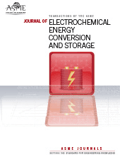
Journal of Electrochemical Energy Conversion and Storage
Empowering Energy Engineering for TomorrowThe Journal of Electrochemical Energy Conversion and Storage, published by ASME, is a premier platform for cutting-edge research in the fields of electrochemistry, energy engineering, and materials science. With an ISSN of 2381-6872 and an E-ISSN of 2381-6910, this journal aims to disseminate high-quality articles that contribute to the understanding and application of energy conversion and storage technologies. Notably recognized in the 2023 Category Quartiles as Q2 in multiple categories including Electronic, Optical and Magnetic Materials, Energy Engineering and Power Technology, and Mechanical Engineering, it reflects a strong academic impact within its field. The journal also boasts competitive Scopus rankings, highlighting its relevance and influence across disciplines. Operating under an open access model, the journal ensures that research findings are widely accessible, fostering collaboration and innovation among researchers, professionals, and students globally. As we move toward a more sustainable future, the Journal of Electrochemical Energy Conversion and Storage plays a critical role in advancing technologies that promise to reshape how we harness and utilize energy.

eScience
Unlocking the Future of Materials and Renewable EnergyeScience, published by KEAI PUBLISHING LTD, is an innovative open-access journal that has rapidly established itself as a leading platform in the fields of Electrochemistry, Materials Chemistry, and Renewable Energy, Sustainability, and the Environment. Since its inception in 2021, eScience has garnered recognition for its high-quality research, achieving an impressive Q1 ranking in each of its primary categories as of 2023. With a remarkable Scopus ranking—placing it among the top percentile of journals in these disciplines—eScience serves as an essential resource for researchers and practitioners aiming to advance knowledge and application in sustainable practices and materials innovation. As an open-access journal, eScience supports widespread dissemination of vital research, ensuring accessibility for all, which is critical in addressing contemporary global challenges. The journal's commitment to fostering interdisciplinary dialogue and collaboration positions it as a cornerstone for those dedicated to pushing the boundaries of scientific discovery.

Energy Material Advances
Transforming Ideas into Energy BreakthroughsEnergy Material Advances, published by the American Association for the Advancement of Science, stands at the forefront of energy research, showcasing groundbreaking studies in the realm of renewable energy, fuel technology, and materials science. With the journal's commitment to open access since 2020, it aims to democratize knowledge and foster innovation across a global community of researchers, professionals, and students. The journal boasts an impressive impact factor, placing it firmly within the Q1 category across multiple disciplines including Energy (miscellaneous), Fuel Technology, and Renewable Energy, Sustainability and the Environment, highlighting its significance in advancing scholarly discussions. In the latest Scopus rankings, Energy Material Advances ranks among the top 10% of journals in its field, affirming its role as a pivotal resource for current and emerging trends in energy materials. The journal is dedicated to facilitating collaborative efforts and inspiring novel approaches to the challenges posed by energy sustainability and technological advancement.

ACTA CHIMICA SINICA
Pioneering Discoveries in General and Miscellaneous ChemistryACTA CHIMICA SINICA, published by SCIENCE PRESS, is a distinguished peer-reviewed journal in the realm of Chemistry, specifically focusing on general and miscellaneous chemistry fields. Since its inception in 1982, the journal has consistently contributed to the advancement of chemical research in China and beyond, maintaining a reputable standing within the academic community, evidenced by its 2023 Scopus ranking of #197 out of 408 in its category. With a current impact factor placing it in the Q3 quartile, ACTA CHIMICA SINICA aims to disseminate innovative research findings, covering a wide spectrum of topics within the discipline. Although it is not an open-access journal, it offers various access options through institutional subscriptions, ensuring that its high-quality content is available to a broad audience. Researchers, professionals, and students alike will find this journal a vital resource for keeping abreast of developments in the field and for contributing their own findings to an engaged scientific community.

Batteries-Basel, published by MDPI, is a premier open-access journal since 2015 that aims to serve the growing community focused on the technological advancements and innovations in battery science and related fields. Operating from its base in Switzerland, this journal publishes high-quality research covering the fields of Electrical and Electronic Engineering, Electrochemistry, and Energy Engineering and Power Technology. With a commendable Q2 ranking in multiple categories for 2023, it consistently strives to present cutting-edge studies, reviews, and practical applications that drive progress in energy storage technologies. Researchers and professionals will find invaluable insights within its pages, contributing to both theoretical understanding and practical deployment of battery technologies. Open access provides broad dissemination of knowledge, ensuring that discoveries reach a global audience, and fostering collaborative efforts to address the challenges posed by modern energy demands.
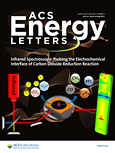
ACS Energy Letters
Leading the Charge in Energy Research and SustainabilityACS Energy Letters, published by the American Chemical Society, is a prestigious peer-reviewed journal designed to disseminate innovative and impactful research in the multifaceted field of energy science. Since its inception in 2016, the journal has quickly ascended to a remarkable status, achieving Q1 rankings in critical categories including Chemistry (miscellaneous), Energy Engineering and Power Technology, Fuel Technology, Materials Chemistry, and Renewable Energy, Sustainability and the Environment as of 2023. With an emphasis on rigorous research methodologies and interdisciplinary collaboration, ACS Energy Letters serves as a vital platform for scholars, professionals, and students to explore cutting-edge research that addresses contemporary energy challenges. While maintaining a commitment to advancing knowledge without open access, it offers profound insights into sustainable practices and innovative solutions that are crucial for the future of energy systems globally. The journal's esteemed standing in the chemical and energy sectors underscores its significance, making it an essential resource for anyone invested in the advancement of energy technologies and sustainable practices.
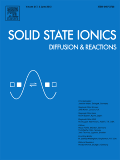
SOLID STATE IONICS
Unveiling innovations in solid state ionics.SOLID STATE IONICS, published by Elsevier, is a prestigious academic journal dedicated to the field of solid state ionics. Since its inception in 1979, the journal has steadily contributed to the advancement of knowledge regarding ionic conduction in solid materials, which is paramount in a multitude of applications, from energy storage systems to sensor technology. As evidenced by its strong ranking in 2023—positioned in the Q2 quartile across Chemistry, Condensed Matter Physics, and Materials Science—SOLID STATE IONICS is recognized as a vital resource for researchers, professionals, and students alike, providing high-quality peer-reviewed articles that foster scientific collaboration and innovation. Its ISSN is 0167-2738 and E-ISSN is 1872-7689, with an ongoing publication schedule aimed at featuring cutting-edge research through 2024. As an essential conduit for the dissemination of important findings in the field, researchers seeking to publish their work or explore new frontiers in solid state ionics will find this journal an invaluable resource.
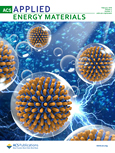
ACS Applied Energy Materials
Elevating the Science of Energy MaterialsACS Applied Energy Materials, published by the American Chemical Society, is a premier journal dedicated to the cutting-edge fields of energy materials, chemical engineering, and electrochemistry. With an impressive impact factor and consistently ranked in the Q1 category across multiple disciplines—including Chemical Engineering, Electrical and Electronic Engineering, and Materials Chemistry—this journal serves as a pivotal platform for researchers and professionals focused on innovative solutions for energy systems and materials science. Since its inception in 2018, ACS Applied Energy Materials has been committed to disseminating high-quality research that addresses pressing energy challenges, promoting sustainability and efficiency in various applications. Its competitive Scopus rankings reflect the journal's influence and relevance within the academic community, making it an essential resource for anyone looking to stay at the forefront of energy materials research.
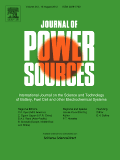
JOURNAL OF POWER SOURCES
Exploring Breakthroughs in Energy Storage and ConversionThe Journal of Power Sources is a premier multidisciplinary journal published by Elsevier, focusing on the advancement of technology and science in the field of power sources. Established in 1976, it showcases high-quality research spanning traditional and emerging technologies related to energy storage, conversion, and utilization. With a strong commitment to impact, this journal ranks in the Q1 quartile for several categories, including Electrical and Electronic Engineering, Energy Engineering and Power Technology, and Renewable Energy, Sustainability, and the Environment, reflecting its broad influence and esteemed contributions to the field. The journal is highly regarded within Scopus, holding impressive rankings such as Rank #33 in Electrical and Electronic Engineering and Rank #13 in Energy Engineering, among others, positioning it well within the scientific community. While the journal is not open access, it remains pivotal for professionals, researchers, and students seeking to stay at the forefront of developments in power sources. The continuity of its publication until 2024 further ensures that it will remain a key resource for innovative research and technological advancements in energy solutions.